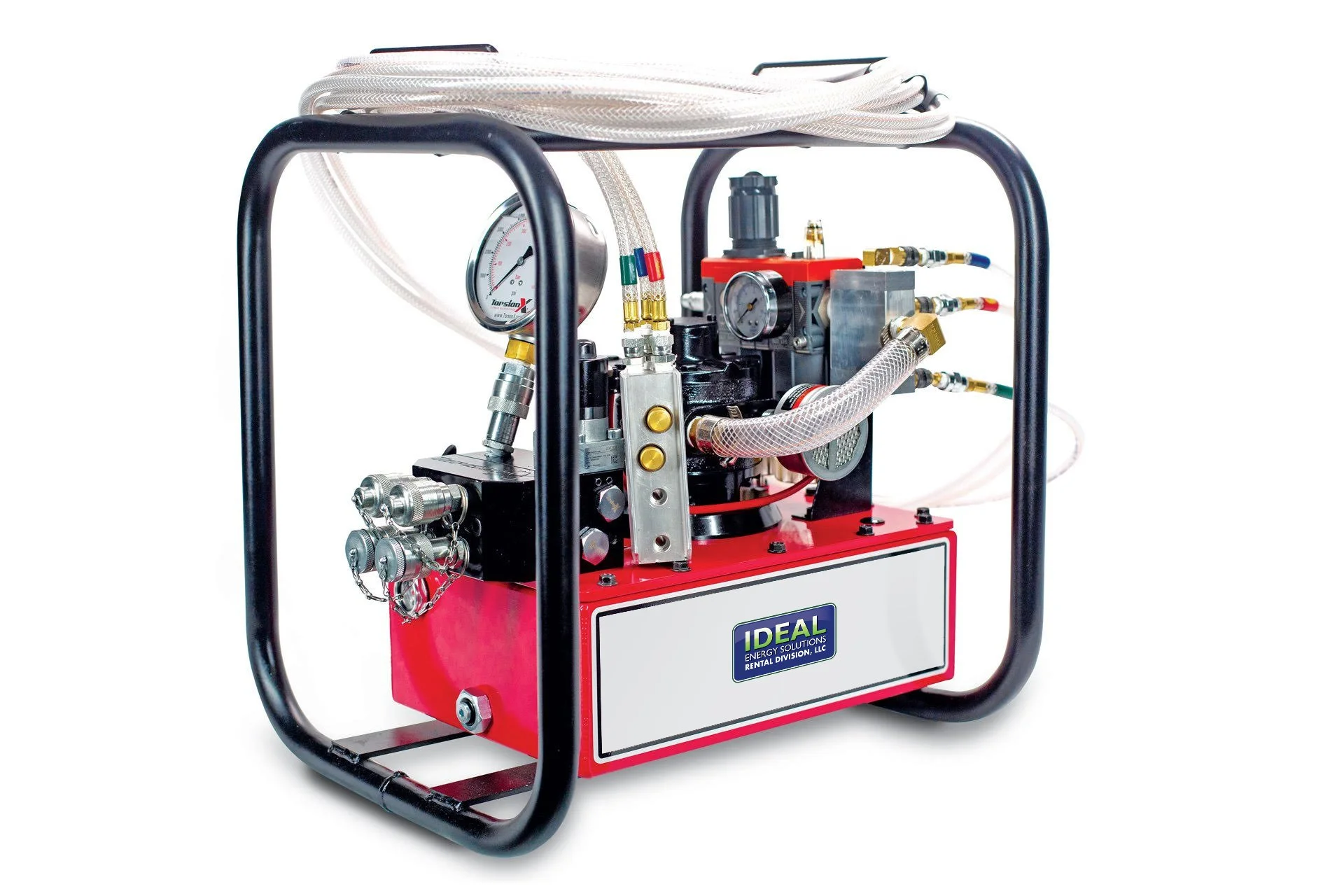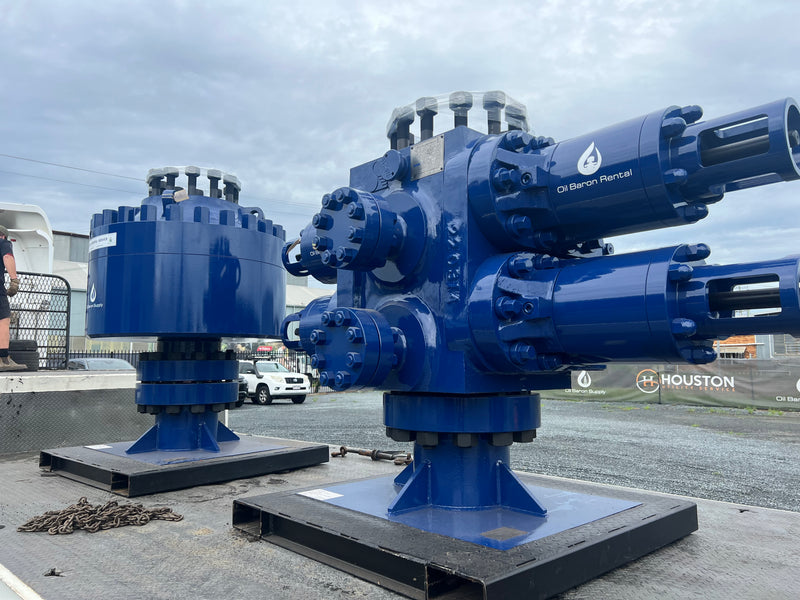A Comprehensive Guide to the Various Kinds Of Oil Field Equipment and Pipeline Equipment Available
The oil and gas market relies greatly on specialized devices for effective extraction and transportation. Different kinds of equipment, from drilling rigs to tank, play essential functions in this complex process. Each piece of tools offers unique functions that add to total operational success. Understanding these elements is vital for any individual entailed in the market. As the market progresses, so as well do the technologies that sustain it. What developments are on the perspective?

Drilling Rigs: The Backbone of Oil Expedition
Drilling rigs function as the important equipment in the domain name of oil expedition, allowing business to accessibility hydrocarbon gets buried deep under the Earth's surface area. These rigs come in various kinds, including land rigs, offshore rigs, and mobile units, each created to run in specific settings. Furnished with innovative modern technology, drilling rigs can penetrate geological formations with precision, making certain effective resource extraction. The structural honesty and functional abilities of these rigs are important, as they should hold up against severe conditions and considerable stress. Additionally, the option of a boring rig impacts the overall job cost and timeline, making it an important factor to consider for oil firms looking for to enhance their exploration initiatives and optimize performance in their operations.
Pumps: Crucial for Fluid Activity
In the oil extraction process, the function of pumps is considerable, facilitating the activity of fluids throughout different phases of production. Pumps are essential for delivering petroleum, water, and other liquids from below ground storage tanks to the surface area and after that via pipelines to refineries. They can be found in various types, consisting of centrifugal, favorable displacement, and completely submersible pumps, each offering details functions based on the fluid attributes and operational requirements. Centrifugal pumps are typically used for their effectiveness in high-flow applications, while positive displacement pumps succeed in dealing with viscous liquids. The choice of pump influences overall efficiency, operational safety and security, and maintenance prices. Proper option and upkeep of pumps are essential for maximizing manufacturing and reducing downtime in oil field procedures.
Shutoffs: Managing Flow and Pressure

Shutoffs play a crucial function in handling the circulation and stress of liquids within oil fields and pipelines. Different types of valves serve unique applications, each created to meet certain features essential for reliable operation - Superior Rentals midland. Understanding the qualities and usages of these shutoffs is necessary for maximizing system performance and safety
Sorts of Valves
Necessary parts in oil area operations, valves play an important duty in regulating the flow and pressure of fluids within pipes and equipment. Numerous types of valves are utilized to meet the diverse needs of oil and gas manufacturing. Common types include gateway shutoffs, which offer a straight-line circulation and marginal stress decrease; world valves, recognized for their strangling capabilities; and sphere shutoffs, identified for their quick on/off control. In addition, check shutoffs avoid backflow, while butterfly shutoffs provide a lightweight service for regulating flow. Each shutoff type is created with specific products and configurations to withstand the rough problems typically found in oil fields, guaranteeing reliability and effectiveness in operations. Understanding these kinds is vital for efficient system administration.
Valve Applications and Features
While numerous sorts of valves serve unique purposes, their key applications rotate around managing flow and stress within oil and gas systems. Valves such as gateway, globe, and sphere shutoffs manage liquid activity, guaranteeing peak performance and safety. Entrance valves are generally used for on/off control, providing very little circulation resistance. Globe shutoffs, on the various other hand, offer precise circulation regulation, making them ideal for see throttling applications. Sphere valves are preferred for their fast operation and tight securing capabilities. Furthermore, stress relief shutoffs are crucial for preventing system overpressure, securing devices integrity. On the whole, the suitable option and application of shutoffs enhance functional performance, making sure the reputable transportation of oil and gas through pipelines and processing facilities.
Compressors: Enhancing Gas Transportation
Compressors play an important role in the effective transport of gas, ensuring that it moves smoothly via pipelines over fars away. These devices boost the pressure of all-natural gas, allowing it to conquer friction and elevation changes within the pipeline system. In addition, compressors promote the harmonizing of supply and need, suiting changes in consumption and production rates. Various kinds of compressors are used in the sector, consisting of centrifugal, reciprocating, and rotary screw compressors, each offering unique benefits based upon the operational needs. Regular maintenance of these compressors is vital to make the most of performance and lessen downtime, eventually adding to a reliable gas transportation network. Their important function underscores the value of compressors in the total oil and gas infrastructure.
Storage Tanks: Safe and Efficient Fluid Monitoring
Efficient transportation of gas depends on various support group, among which is the correct administration of tank. These tanks play a vital role in securely having liquids, making sure that functional effectiveness is kept while minimizing ecological risks. Constructed from long lasting materials, they are designed pipe fix plumbing to hold up against high stress and destructive elements. Appropriately sized and purposefully located, storage containers assist in the smooth circulation of gas and various other liquids, preventing bottlenecks in supply chains. Routine maintenance and tracking are critical to detect leaks or architectural problems, promoting safety and security and compliance with regulatory requirements. Eventually, the reliable monitoring of storage space tanks is important for the overall stability and reliability of the oil and gas sector's liquid handling systems.
Pipeline Systems: Framework for Transportation
Pipeline systems serve as the foundation of the oil and gas sector, helping with the reliable transportation of hydrocarbons over large distances. These systems are composed of various parts, including pipelines, shutoffs, pumps, and compressors, all diligently made to ensure seamless flow. The materials utilized in pipeline construction, often steel or high-density polyethylene, are chosen for sturdiness and resistance to corrosion. Pipeline networks can cover throughout land and water, attaching manufacturing sites to refineries and distribution facilities. Furthermore, progressed innovation makes it possible for real-time monitoring of flow rates and pressure levels, improving operational performance. The critical placement of these pipelines lessens environmental impact while optimizing resource access, consequently playing an essential role in meeting power demands around the world.
Security Equipment: Ensuring Employee and Environmental Defense
The operation of pipeline systems, while important for power transportation, additionally provides significant safety difficulties for employees and the atmosphere. Security tools plays a significant function in mitigating these risks. Personal safety equipment (PPE) such as headgears, gloves, and non-slip shoes safeguards workers from physical threats. In addition, gas detection systems check for leakages, making certain that damaging compounds do not posture a threat to employees or the bordering ecological community. Emergency closure systems are necessary for rapidly halting procedures during a dilemma, avoiding prospective calamities. Spill control materials, consisting of absorbents and barriers, are basic for lessening environmental effect. On the whole, buying comprehensive security tools is important for preserving operational integrity and safeguarding both workers and Resources the atmosphere in the oil and gas market.

Often Asked Concerns
Exactly how Do I Pick the Right Oil Field Equipment for My Task?
Selecting the right oil field devices entails examining project specifications, budget plan restraints, and functional needs. Consider factors such as devices integrity, compatibility with existing systems, and the provider's reputation to ensure peak performance and security.
What Are the Upkeep Needs for Oil Field Equipment?
Maintenance requirements for oil area tools include normal inspections, lubrication, and timely fixings. Operators ought to additionally adhere to supplier guidelines, display efficiency metrics, and warranty compliance with safety guidelines to improve durability and performance.

Just How Can I Guarantee Conformity With Environmental Rules?
To assure compliance with ecological policies, firms should carry out regular audits, implement ideal techniques, buy training, maintain proper paperwork, and remain updated on regulations (Superior Oilfield pipeline equipment rentals). Collaboration with environmental companies can additionally improve adherence to policies
What Is the Ordinary Life-span of Pipeline Equipment?
The typical lifespan of pipeline equipment usually ranges from 20 to 50 years, relying on variables such as worldly quality, ecological conditions, and upkeep practices. Regular examinations can significantly affect longevity and functional efficiency.
Exactly how Do I Securely Carry Oil Field Equipment to Remote Locations?
Moving oil area devices to remote areas requires cautious preparation, including route analysis, securing licenses, using suitable lorries, and guaranteeing safety protocols are complied with. Proper training and communication amongst teams are necessary for successful transport.